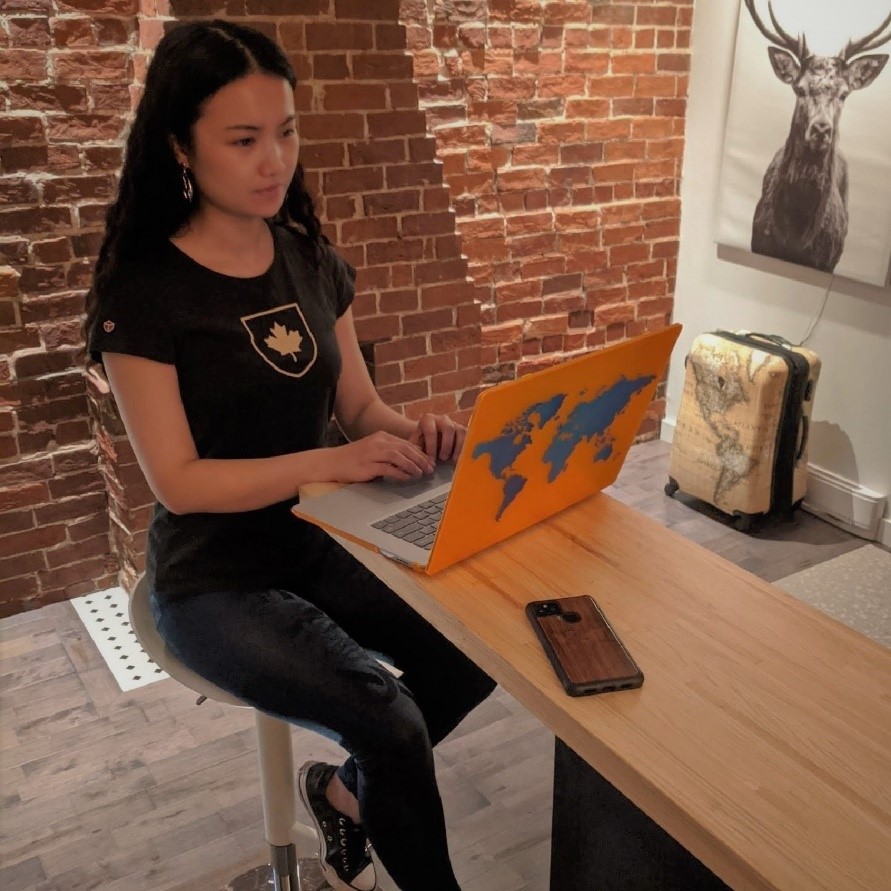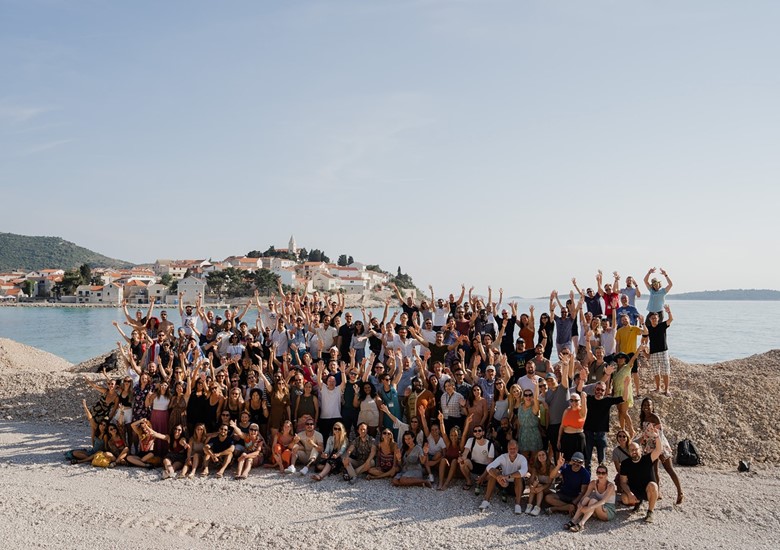Ariel Fu is the founder of WorkAnywhereGo, a venture on a mission to help people achieve location independence. Prior to launching WorkAnywhereGo, she worked in the corporate world on Bay Street for seven years. In this interview with the Information and Communications Technology Council (ICTC), Ariel discusses her company and the pros and cons of location independence.
What made you decide to start WorkAnywhereGo?
Travel has always been my number one passion. Growing up, I was fascinated by how people in different regions view and build things differently. When I lived in my location-locked nine-to-five life, I often found myself working all year just for that three or four weeks of vacation when I could finally go explore. I also didn’t feel a strong sense of community in Toronto. From a socio-economic perspective, remote work took off during the pandemic and helped a lot of us realize that work didn’t need to be that way.
Then as I planted the seeds for myself to become a digital nomad, I realized there are still a lot of barriers to truly working from anywhere. For example, the majority of remote jobs come with a level of geographic mobility restriction, and there isn’t a lot of information available about setting up logistics like tax information, healthcare, or insurance in the Canadian context. So there’s definitely a big information gap as well as further advocacy work to be done.
As an overthinker, I like to do a lot of research and exhaust the options to find the optimal solution, so I thought to myself, why not share my findings so more people can benefit from them on their transformation journey, and that was how I first thought of starting WorkAnywhereGo. I believe the future of living is digital nomadism, and I want to dedicate my time to help more people achieve location freedom. So I began to focus on building a community rather than just the information piece. I believe that you can’t give yourself more time, so give your time more life.

Tell me a little about your process of becoming a location independent. Did you stick with the same job? Did you stay in the same home in Toronto?
Before I launched my digital nomad life, I had followed a lot of digital nomad thought leaders and tried to determine if it was a life I would enjoy. Then I started to do a lot of research and preparation to make sure I was setting up my logistics properly.
I did not stick with the same job because most jobs in the market today, including remote jobs, would not give you the flexibility to work from anywhere. Especially big corporations would typically have very pronounced rules about your geographic presence due to tax, benefits, and cyber security.
I decided to explore entrepreneurship because I’m hoping to establish a system where I can build passive income streams for years to come. But of course, there are many other ways to achieve location independence. You can turn yourself to a contractor and continue to work with your current employer. You can also become a freelancer getting access to opportunities all over the world.
Having to pay for expensive rent in downtown Toronto from my office-working days was also a contributing factor that made me expedite my digital nomad launch because I knew my cost of living would be much lower elsewhere. If I could have found a much cheaper place in the suburbs with a reasonable level of public transportation access, I probably wouldn’t necessarily feel a rush to leave Toronto.
How do you envision WorkAnywhereGo going forward?
I’m building a community for aspiring digital nomads, where they can seek information about location-independent career options as well as the best way to set up nomad logistics. You will be able to seek consultation based on your field of work as well as nationality among a network of established nomads. I am also evaluating other initiatives such as educational events and retreats.
When you travel, how do you choose your destinations?
My mission for the first 12-18 months is to visit the top digital nomad locations, for example, Bali, Chiang Mai, Lisbon, Madeira Island, Canary Island, Playa del Carmen, and Medellin. In these nomad hubs, I can easily connect with like-minded, global-focused, and forwarding-looking nomads, and network and learn from one another via established nomad infrastructure such as coworking and co-living organizations as well as nomad events.
You mentioned you wanted to find a stronger sense of community through travel—have you been able to maintain friendships while working and travelling?
Some might see constant movement as a barrier to maintaining friendships. I agree that geographic separation does play an undeniable effect in maintaining relationships, but I think the depth of connection you’re able to build with people is not necessarily tied to how often you see these people in-person. If the conversations with my colleagues never go past the “how was your weekend” level, I could see them in-person every day for years but still not develop a deep connection with them.
I try to utilize digital tools, online communities, and virtual events to engage with my friends in a meaningful way. I love the idea of “portable community.” Even though we are not geographically located at the same place, our shared values and vision for the future of living bring us closer and drive us to gather and help each other via Slack, Discord, or other online vehicles. Also, because we have more mobility freedom, we often cross paths in the same city or at the same event.
Interestingly, people have written that loneliness and lack of connection is the number one reason why digital nomads stop travelling. But other research is emerging on this topic, including some that looks at the role of “third spaces” for remote workers—so co-working spaces, cafes, or libraries, for example—and finds that they help remote workers feel connected to people.

Ariel at the Nomadbase Conference in Primošten, Croatia
Some people have criticized the location-independent lifestyle for its carbon footprint. What do you think of digital nomads’ environmental impact?
It’s a great question, and I can totally understand why people would have this concern but, first of all, let’s demystify the assumption that digital nomads are hopping from place to place every few days. In fact, you’ll rarely see people doing that. There are a few categories of nomads: there are people like me who live out of a suitcase, and there are seasonal nomads who only travel every few months of the year. For most nomads I’ve seen, we like to stay at one location for at least a month because this way you switch from vacation-styled travelling to nomad-styled living, also because the rent is much cheaper when you book for a month.
Secondly, most digital nomads are big consumers of the sharing economy, whether it be public transportation, ridesharing, or co-living. On the other side, it could also be argued that carbon emissions created by people living in one place but driving private non-electric vehicles all the time is not necessarily lower than digital nomads moving around but opting for public transportation most of the time.
I view global mobility as an advancement of human rights, and I’m hoping we can still explore a potentially better way of living while keeping the climate impact in mind all the time. Since the world has been working on deploying alternative energy to reduce carbon footprints, I’m hoping we can find a balance between the pursuit of mobility freedom and carbon footprint reduction.
What do you think the location-independent movement means for Canada?
Canada takes pride in population diversity and bringing in highly skilled, young talent, however, on the outflow side, Canadians permanently leaving the country was unusually high in the first quarter of 2022. Based on a recent survey, one in three educated young immigrants plan to leave Canada in the next two years. It will be interesting to observe how the social dynamic will change in the next few years following the pandemic.
Canada is overall a very good place to call home because of social stability, income level, progressive social dynamics, free healthcare, etc. And that’s why in many parts of the world, people think of Canada as one of the top options to immigrate to. In my humble opinion, I don’t think people want to leave Canada for good and never come back. For some people, it might be just a few months of escaping the harsh winter, and for other people, they just would like to explore more of the world before coming back to Canada.
I think instead of restricting people to work and live in one place while realistically they can perform the same remote work elsewhere, we should start to explore a framework where people work and live in a safe and secure global mobility ecosystem, instead of forcing people to think about how to move to countries with favourable digital nomad visa offers.
At my co-living locations, I’ve met people who are sponsored by their companies to work and live in other cities. Companies can partner with global mobility agencies such as Remote and Velocity Global to legitimize their workforce working from other parts of the world.
I think that building a liberal environment for remote work, where people can move more freely and still contribute to the Canadian economy, could help us retain and attract more talent.
Learn more:
WorkAnywhereGo’s official website is still under construction, but you can learn more about the community or reach out to Ariel directly via Instagram or LinkedIn.

Ariel Fu is the founder of WorkAnywhereGo, a venture with a mission to help working professionals achieve a location-flexible life through resources, consultation, skill development, and community support. Prior to launching her digital nomad life, she worked in product management and project management on Bay Street for seven years after earning an MBA with a specialization in finance from McMaster University. Now she’s living the digital nomad life and visiting the top nomad cities in the world while building a network to help aspiring digital nomads make the leap. She is passionate about travel, cross-cultural collaboration, and connecting people with a shared purpose.
